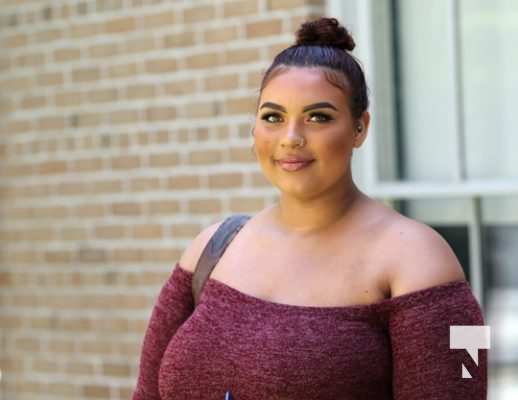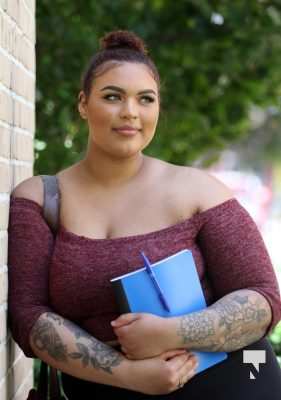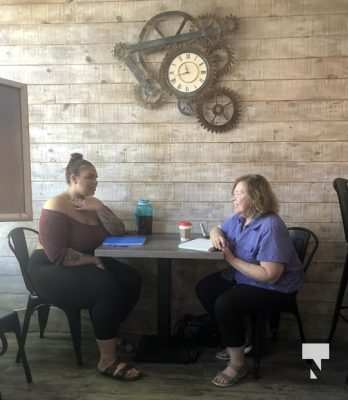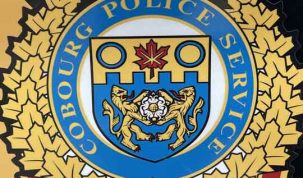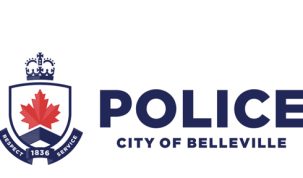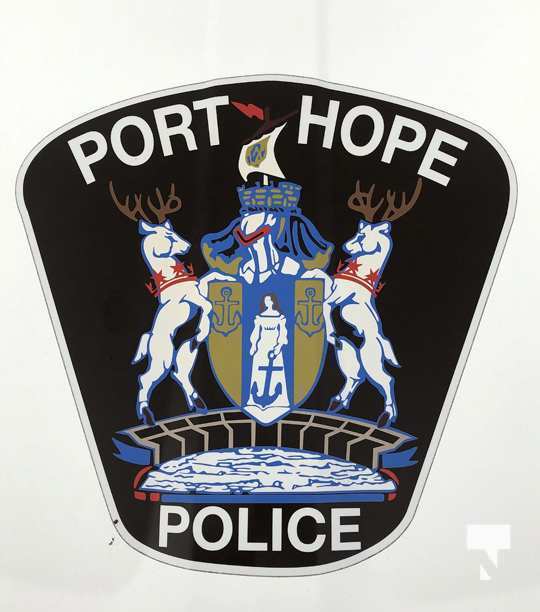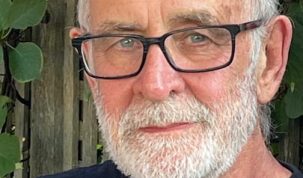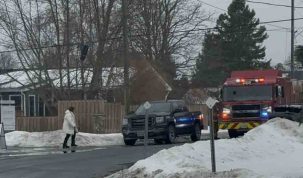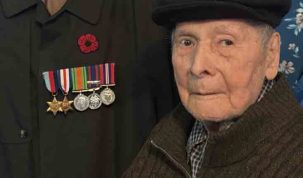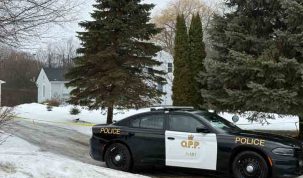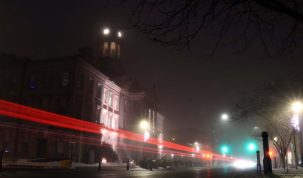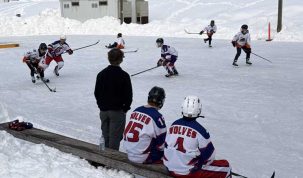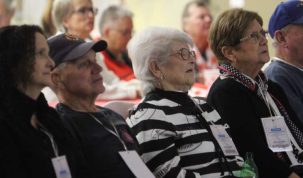By Cecilia Nasmith/Today’s Northumberland
Renee King, a Cobourg resident who was in attendance at last week’s Black Lives Matter rally in Victoria Park, has heard arguments and the buzz words on all sides and would like to offer the perspective of a young Black woman to the debates of the day.
Racial tensions have erupted – sometimes violently – in the two weeks since Minneapolis resident George Floyd died while in police custody, his death filmed as a police officer knelt on his neck for almost nine minutes in spite of choked-out pleas that he could not breathe. As hundreds of thousands of protesters turn out literally around the world, the decades-old debate has taken on new urgency.
King, who moved to this area 13 years ago, thinks it has never been more important to make a real effort to understand the true issues and the history behind them.
Cobourg is a predominantly white town, she said in an interview this week, “and I think that it’s important people understand the history of what’s going on, why we are doing these things, why Black lives matter – to answer all the rebuttal questions like when people say all lives matter and bring on statistics on Black-on-Black crime.
“A lot of people say racism doesn’t exist any more. I’m sure, as a white straight male living in Cobourg, you are not going to see racism – as opposed to me, a Black woman who is also part of the LGBTQ community. I’ve lived here for more than a decade, and I’ve seen my fair share of racism here.”
Incidents spring easily to mind, for King – people crossing the street as she approaches, entering a store and being followed around.
She would not label Cobourg is a racist town, but she does believe its people are unaware of many aspects of what is going on in the world because they don’t pertain to their own lives. And because there are not that many Black people in town, they may not have the opportunity to learn these things.
But if ever there were a time to learn, it is now when the issue plays out 24/7. The term white privilege is an example.
Faced with the phrase, she has found white people go on the defensive. They argue that they’ve faced hardship all their lives, so they reject the idea.
“No one is saying your life isn’t hard, but it’s not harder because of the colour of your skin,” King explained.
“You can walk in your neighbourhood. You can walk into the store. You can be in your own home and not have the police called on you and ultimately killed.
“Why is it when a white kid goes into a Black church and prays with them, then opens fire and there’s a mass shooting, the police take him out and give him water and food, but when a Black guy is called out for a supposed counterfeit bill, he ends up dead for no reason.”
The cell-phone footage of bystanders and even street security cameras show George Floyd was completely compliant, she noted.
People offer statistics that white people are killed at a far greater rate than Black people, but the fact is that 70% of the population is white. Put the number of deaths by race on a proportional basis, King pointed out, and the death rate for Black people is eight times higher.
Some counter the phrase Black Lives Matter with All Lives Matter, which King characterized as “a protest to our protest.
“All Lives Matter wasn’t a thing until Black Lives Matter was a thing. It’s like you’re fighting breast cancer, and someone says, ‘What about colon cancer?’
“No one is saying your life doesn’t matter. Of course your life matters. But right now, Black lives don’t seem to be mattering and it’s a big issue. All lives can’t matter until Black lives do.
“People say we’re all God’s children. We understand, but that’s not what we are seeing. This is a much bigger picture, and I think that gets uncomfortable for a white person. But get comfortable with being uncomfortable, because we’re uncomfortable all the time.”
King has heard too many people reject the idea that Canada has had slavery. In fact, the last sale of a slave in Canada took place just down the road in Colborne. Slavery may have stopped sooner than in the US and there may have been fewer slaves, but you can’t ignore its existence (or the fact that some provinces, like Nova Scotia and New Brunswick campaigned hard to keep it).
Some point out that it was a long time ago and Black people need to stop dredging it up. For these people, King would offer a reminder.
“Our humanity was co-defined by law. We are the only people in world history not considered people. We had to fight for our humanity before we could fight for freedom, our humanity, our equality, and now we are at the fourth step, which is survival.”
Like ripples in a pond, that history of slavery continued to be felt. When it was abolished, that left four- to five-million former slaves who were no longer wanted because they were no longer of benefit to their former owners.
“There were no jobs for them and no one’s going to give them any jobs, so they are going to loot and steal because they are hungry, they are homeless,” King said.
“They get life sentences for loitering, 10 years for stealing a lollipop. Now, in the prisons, they do hard labour.”
For more information on this issue, King would strongly recommend the series 13th on Netflix, that being the number of the amendment to the US Constitution that abolished slavery. She also recommends the Netflix series When They See Us.
King watched a real double standard played out over the weeks leading up to George Floyd’s death. There have been plenty of demonstrations even before that incident, but their message was to open up the economy in spite of the continuing coronavirus emergency. People were screaming out their rage and brandishing their AK47s in the name of being able to get a haircut.
Judging by President Trump’s tweets, she said, people who want haircuts are good people, while people demonstrating against police brutality are thugs.
“All this, when we are trying to say our lives are just as important as yours, and we’re being tear-gassed and maced – even more police brutality.”
While 4.2% of the population is Black, she said, they account for 40% of the prison population. Part of it, she suspects, is selective enforcement – for example, a ghetto has far more police on patrol than a white suburb.
“Black people grow up rehearsing that moment when the police pull them over – hands on the steering wheel, license accessible so you don’t have to go in your pocket for it,” she said.
The result over time is a real distrust many Blacks feel for any police presence.
“If there are 10 bad cops and 1,000 good ones who won’t do anything about the 10 bad ones, the system is bad,” she stated.
“Until those issues within the system are fixed, it’s sad but it’s true. Hopefully with this George Floyd thing being so publicized, they are going to know we are watching them.”
The issue is playing out in demonstrations around the world, from the United Kingdom and Denmark to Liberia and New Zealand. The day before the rally in Victoria Park, King attended one in Kitchener where the crowd was estimated at 30,000.
Uncertain what person or organization was behind last week’s Cobourg gathering, she was skeptical that it was a self-conscious exercise for participants to show how woke they are, but in the end she thought it was a great idea. And it gave her the opportunity to speak with a town councillor to share her concerns that, as a Black woman, she feels she is not adequately represented.
It mystifies her why there are not more Black people in Cobourg, and can only conclude it’s not a community they feel comfortable coming to.
Watching the hoopla as the pride crosswalk was unveiled, she continued, “we need to have that energy on all fronts. We need to do better.”
Even something as simple as featuring Black artists in the Art Gallery of Northumberland or Black musicians in the Victoria Park bandshell would be a start, she said.
In the history of racism, King has seen events that purport to be turning points. Yet here we are in 2020, she said, and the problem does not seem to be improving.
“It’s hard to hope for change sometimes, when nothing is changing,” she said.
“It’s hard to get ahead in a world that wasn’t meant for you to get ahead.
“I’ve done a lot of self-reflecting the last couple of years about coming here when I was 10.”
Her family lived in Grafton at the time. As she entered Grafton Public School, she found herself not only the sole Black child in her class, but the sole Black child in the school.
In response to being made fun of, she worked at the cosmetics – processing her hair, tinkering with her make-up – and tried to make friends.
A visiting Black child from Toronto came to GPS one day, and classmates just assumed they were related. She distanced herself from the visitor by putting her down – an act she relates with shame as an adult.
She’s also somewhat embarrassed by how many children she gave a pass to when they used the N word, all in the name of having friends.
“Subconsciously, that’s what happens. It’s the little micro-racial things that happen to you that cut you up until you feel so inferior to everybody and everybody is better than you are, their views are better than yours,” she said.
King is sometimes asked what a white person can do to be an ally to the cause. It takes much more than a Facebook or Instagram post, making a donation or signing a petition.
“The biggest thing is to self-reflect and ask yourself why is it just now you are realizing you have to be an ally. What are some of the things you ignored, what are some of the things you assume about Black people, what are some of the things you let go?”
So many white people congratulate themselves on having a Black friend, but King hopes the accent will be on the word “friend.” When you are in a group and something is said that isn’t right, she said, step up and challenge it instead of leaving it for your Black friend to do.
“Don’t be afraid to call out family members and friends, not be complacent, not be quiet about the things that are going on.”
White privilege can be used to good ends, she pointed out, since whatever a white person says is far more apt to be accepted than what a Black person says. She hopes speaking some hard truths loudly and clearly in a white person’s voice will carry them farther to even more listeners.
Speak out about police brutality and excessive force that must be stopped. Like George Floyd, Trayvon Martin was co-operative and got killed anyway, and that’s just one name on a long, terrible roll call of similar incidents.
Lose the defensiveness and realize that racism is everywhere – even China, she pointed out, which has virtually become a Jim Crow society where Blacks are barred from stores, kicked out of their homes, refused health care, even blamed for the COVID-19 pandemic.
And in Canada, she added, we have the added wrinkle of racism against our own Indigenous population.
Ignore the stereotypes, such as the one that blames riots on angry Black men.
“We are just getting so sick of literally being kicked while we are down, because it’s not all Black people starting the riots. It’s white people starting riots too. Six-million people have lost their jobs – funds are tight and they have nothing going on right now, and they are going to take advantage of the situation,” King said.
“There are a lot of people taking advantage of the situation that are not part of the protest.”
Speak out. It may be Cobourg, she said, but she’s been called the N word and seen Confederate flags on display (with the lame excuse that they’re from The Dukes of Hazzard).
“We both know what it means – there’s no way around it,” she said.
“We are supposed to be a community where everyone is equally represented. We support the minorities, the LGBTQ community, the women, the people of colour, the Black people, the Indigenous people. Whether there are a bunch of us or only a few, we should all be respected and treated the same.”


